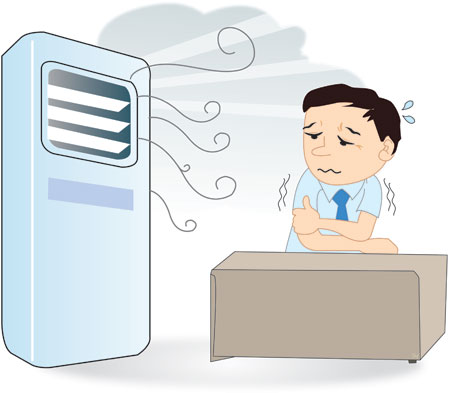Do heating and air conditioning systems make us sick?
The answer isn’t simple about sickness of air conditioning. The systems themselves do not make you ill, but they can have a hand in the process. Systems can be complicated and are made up of a lot more than simple ducts. There is often an outdoor section, an electrical element, filters, air ducts, a compressor, coils and a blower. There are also different kinds of system that work differently from each other. From gravity systems to radiant systems and forced air systems, each has its own method of heating or cooling your home.
The act of blowing cool air at you is thought to increase the chance of a virus spreading, as the cool air can force places on your body, such as the nostrils, to dehydrate. Viruses prefer a low humidity environment, and so you become more susceptible to illness when the air conditioning is on. Unfortunately, there haven’t been many scientific studies to back this up, but most experts would agree that these changes in temperature, from heating and air conditioning systems, can have an effect on your ability to fight away viruses. In conclusion, HVAC systems can have a small effect, but are not the cause of the virus. It should also be taken into consideration that often these systems are used in public areas, such as offices, where they are on a lot more, than say, in the home, where it is easier to maintain a constant temperature
most common air conditioner components that can make you sick

1. The Compressor
AC compressor coils can harbor mold and mildew. When the compressor kicks on, it can spread these contaminants through the entire system, making you sick.
Symptoms of this sickness include a runny nose, itchy eyes, and congestion.
If you have symptoms that seem to get worse near your AC unit, it’s time to have a professional look. They can clean the coils and treat the mold and mildew so you can breathe easily.
2. The Condenser
When your AC unit is turned on, Freon gas is compressed and circulated through the coils in the condenser. The coils release the heat, which is then dispersed into the air outside. If your condenser coils are dirty, they won’t be able to release the heat as efficiently. It can cause your AC unit to work harder than it should, which will increase your energy bills and shorten the lifespan of your unit.
Dirty condenser coils can also make you sick. The Freon gas that circulates through the coils can become contaminated with mold, mildew, and bacteria. When the Freon is released into the air, you can breathe in the contaminants, which can cause respiratory problems.
3. The Evaporator
The evaporator is the part of your AC unit that cools the air. It’s usually located inside the home, and it has a coil that’s filled with refrigerant. As the warm air from your home blows over the coil, the refrigerant inside absorbs the heat from the air, cooling it down.
When the evaporator coil gets too cold, it can cause the air around it to become humid. This can lead to condensation on the coil and drip onto the floor or below furniture. The evaporator coil can also become covered in mold and mildew, which can cause allergic reactions in some people.


